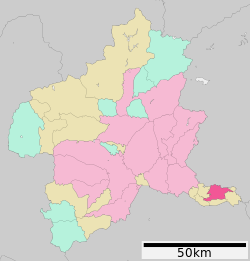Tatebayashi, Gunma
|
Tatebayashi 館林市 |
|||
|---|---|---|---|
| City | |||

Tatebayashi city hall
|
|||
|
|||
 Location of Tatebayashi in Gunma Prefecture |
|||
| Coordinates: 36°14′41.4″N 139°32′31.6″E / 36.244833°N 139.542111°ECoordinates: 36°14′41.4″N 139°32′31.6″E / 36.244833°N 139.542111°E | |||
| Country | Japan | ||
| Region | Kantō | ||
| Prefecture | Gunma Prefecture | ||
| Government | |||
| • Mayor | Kazuo Yasuraoka (since April 2007) | ||
| Area | |||
| • Total | 60.97 km2 (23.54 sq mi) | ||
| Population (February 2015) | |||
| • Total | 76,560 | ||
| • Density | 1,260/km2 (3,300/sq mi) | ||
| Time zone | Japan Standard Time (UTC+9) | ||
| - Tree | Pinus thunbergii | ||
| - Flower | Rhododendron obtusum | ||
| - Bird | Anas poecilorhyncha | ||
| Phone number | 0276-72-4111 | ||
| Address | 1-1 Shiromachi, Tatebayashi-shi, Gunma-ken 374-8501 | ||
| Website | Official website | ||
Tatebayashi (館林市 Tatebayashi-shi?) is a city located in southeastern Gunma Prefecture in the northern Kantō region of Japan. As of February 2015, the city had an estimated population of 75,560 and a population density of 1260 persons per km². Its total area was 60.97 km². Tatebayashi is famous for Azalea Hill Park and Bunbuku Chagama of Morinji Temple.
Tatebayashi is located in the extreme southeastern portion of Gunma Prefecture in the Kantō Plains, bordered by to the north. The Tone River and Watarase Rivers pass through the city.
During the Edo period, the area of present-day Tatebayashi was a castle town and administrative center of Tatebayashi Domain, a feudal domain under the Tokugawa shogunate in Kōzuke Province.
Tatebayashi Town was created within Ōra District, Gunma Prefecture on April 1, 1889 with the creation of the municipalities system after the Meiji Restoration. On April 1, 1954 the town of Tatebayashi and the villages of Satoya, Ōshima, Akabane, Rokugō, Minoya, Tatara, and Watarase merged to form the city Tatebayashi.
...
Wikipedia



